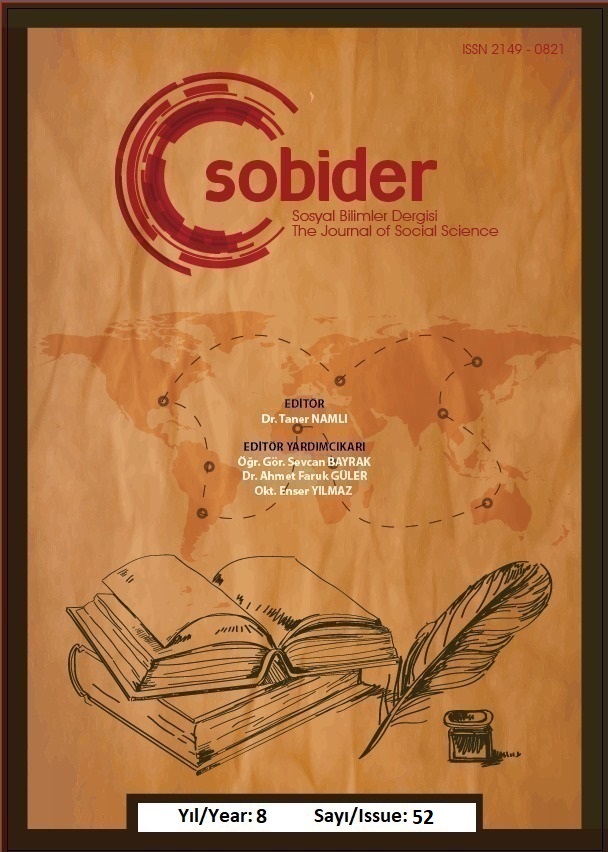Author :
Abstract
İnsan, Antik dönemden beri yaşadığı toplumdaki sorunlardan ve kısıtlamalardan uzaklaşabilmek için bilinmeyen yerlere ulaşma arzusu içerisinde olmuştur. Bahsedilen bu bilinmeyen yerler mevcut toplum yaşamında eksiklik olarak gördüklerinden uzak, hiç bir haritada olmayan yerler olarak tasavvur edilmiştir. Yazın hayatında özellikle siteler, kentler, krallıklar, ülkeler, adalar ve topluluklar bilinmeyen yerlerin mekânı olmuştur. Olmayan ve hiç hiçbir zaman var olmayacak yerlerin anlatımı ütopyalarda vücut bulmuştur. Bir rehber eşliğinde bu toplulukların siyasal, sosyal, kültürel ve dinsel yaşamları hakkında bilgi aktaran ütopyalar, mevcut hayatın karşıtıyla aktarılmış ve yaşanılan dönemin eleştirisi yapılmıştır. Ütopya yazarları kendi dönemsel sorunlarını gözlemlemiş ve toplumdaki eksiklikleri kaleme aldıkları eserleriyle gözler önüne sermişlerdir. Platon’un Devlet adlı eseriyle başlayan ütopya yolculuğu, Rönesans dönemin aydınlanmacı bakış açısına sahip Thomas More’un Ütopya’sı ile ‘ütopya’ kavram olarak edebiyat tarihinde yerini almış ve Tommaso Campanella’nın Güneş Ülkesi eseriyle bilim, edebiyatla buluşturularak merkeze getirilmiştir. Bu çalışmada önce ‘ütopya’ kavramı ve ‘güneş’ sembolü üzerinde durulacak ve çalışmanın ana gövdesini oluşturan Güneş Ülkesi adlı eser, ‘güneş’ ekseninde ele alınacaktır. Çalışma metne dayalı inceleme yöntemiyle incelenecek ve eserde dikkat çeken ‘güneş’ sembolü üzerinde durulacaktır.
Keywords
Abstract
Since ancient times, human beings have had a desire to reach unknown places in order to get away from the problems and restrictions of the society they have lived in. These unknown places were conceived as places that are not on any map and far from what was seen as a deficiency in the current community life. In literature especially sites, cities, kingdoms, countries, islands and communities have been places of unknown places. Narration of places that do not exist and will never exist are embodied in utopias. Utopias transmit information about the political, social, cultural and religious lives of these communities in the company of a guide and convey the opposite of the current life and criticism of the period lived in. Utopia writers have observed their own periodic problems and revealed the shortcomings in society through their works. The journey of utopia, which started with Plato's work called State, took its place in the history of literature as a concept of "utopia" with Thomas More's Utopia, who had an enlightenment point of view of the Renaissance period, and with Tommaso Campanella's work of The City of the Sun, science was brought together with literature and placed to the center. In this study, the concept of 'utopia' and the symbol of 'sun' will be focused on and the work named The City of the Sun, which constitutes the main body of the study, will be discussed in the axis of the 'sun'. The study will be examined through text-based analysis method and the remarkable 'sun' symbol will be emphasized in the work.
Keywords
- Aydın, Hasan. (2006). “Güneş Ülkesi: Eğitim Odaklı Bir Ütopya”. Bilim ve Gelecek Dergisi, Sayı: 32, Ekim 2006, ss.56-63.
- Aydın, Osman. (2020). “Nedim Divanı’nda Kozmik Unsurlar”. Uluslararası Sosyal Araştırmalar Dergisi. Cilt: 13, Sayı: 69, Mart 2020, ss.27-39.
- Bettany, G.T. (2005). Dünya Dinleri Ansiklopedisi. Çeviren: Ahmet Aydoğan, İstanbul, Say Yayınları.
- Campanella, Tommaso. (2018). Güneş Ülkesi. Çeviren: Özlem Pekcan, İstanbul, İkinci Basım, Öteki Yayınevi.
- Cuma, Ahmet. (2013). Sembollerin Dili. Konya, Aybil Yayınları: 17394, Aybil Yayınları.
- Çoruhlu, Yaşar. (2002). Türk Mitolojisinin Anahatları. İstanbul, Kabalcı Yayınevi: 169, Antropoloji-Arkeoloji-Mitoloji Dizisi: 10, Kabalcı Yayınevi.
- Eliade, Mircea. (2003). Dinler Tarihine Giriş. Çeviren: Lale Arslan, Yayıma Hazırlayan: Ergun Kocabıyık, İstanbul, Kabalcı Yayınevi.
- Frazer, James George. (2004). Altın Dal – Büyü ve Din Üzerine Bir Çalışma. Çeviren: Mehmet H. Doğan, İstanbul, Yapı Kredi Yayınları: 2125, Doğan Kardeş: 175, Yapı Kredi Kültür Sanat Yayıncılık.
- Gürkan. Alper. (2018). Ütopya ve Modern Dünya. Ankara, Pruva Yayınları: 6, İnceleme: 1, Pruva Yayınları.
- Hançerlioğlu, Orhan. (2013). Dünya İnançları Sözlüğü. İstanbul, Altıncı Basım, Remzi Kitabevi.
- Köseoğlu, Berna. (2019). “Rönesans Dönemi Ütopyaları”. Ütopyada Edebiyat – Edebiyatta Ütopya, Editörler: Metin Toprak – Güvenç Şar, İzmit-Kocaeli, Umuttepe Yayın: 278, Felsefe Dizisi: 6, Umuttepe Yayınları, ss.101-119.
- Kumar, Krishan. (2005). Ütopyacılık. Çeviren: Ali Somel, Ankara, İmge Kitabevi Yayınları.
- Özkan, Murat Sultan. (2017). “Thomas More, Francis Bacon ve Tommaso Campanella’nın Ütopyalarında Bilim ve Eğitim Felsefesi”. Atatürk Üniversitesi Sosyal Bilimler Enstitüsü Dergisi, Sayı: 21 (2), Haziran 2017, ss.609-624.
- Özsoy, Burak. (2018). “Yitirilen Ütopyanın Yeniden Keşfi: Distopya”. Derleyenler: Aksu Bora – Kadir Dede, Ütopyalar – Politikayla Arzunun Kesiştiği Yer. İstanbul, İletişim Yayınları: 2603, Araştırma-İnceleme Dizisi: 427, İletişim Yayınları.
- Özsoy, Seda. (2017). “Utopia, Güneş Ülkesi ve Yeni Atlantis: Dayanışma Bir Hayal Mi, Yoksa Bir Hakikat Mi?”. İnsan ve Toplum Bilimleri Araştırmaları Dergisi, Cilt: 6, Sayı: 2, ss.1313-1325.
- Öztürk, Faruk. (2006). Ütopya ve Eğitim. Ankara, Nobel Yayın: 1027, Eğitim Yayınları Dizisi: 259, Nobel Yayın.
- Pohl, Nicole. (2017). “More’dan Sonra Ütopyacılık: Rönesans ve Aydınlanma”. Çeviren: Zeynep Demirsü, Ütopya Edebiyatı, Hazırlayan: Gregory Claeys, Cambridge Edebiyat Araştırmaları, İstanbul, Türkiye İş Bankası Kültür Yayınları, ss.71-111.
- Sarcey-Riot, Michéle - Thomas Bouchet - Antoine Picon. (2003). Ütopyalar Sözlüğü. Çeviren: Turhan Ilgaz, İstanbul, Sel Yayıncılık: 201, Sel Yayıncılık.
- Şen, Emre – Fatma Gürpınar. (2019). “Farklı Kültürlerde Güneş Sembolü”. Ulakbilge Sosyal Bilimler Dergisi, Sayı: 43, Aralık 2019, ss.985-1008.





